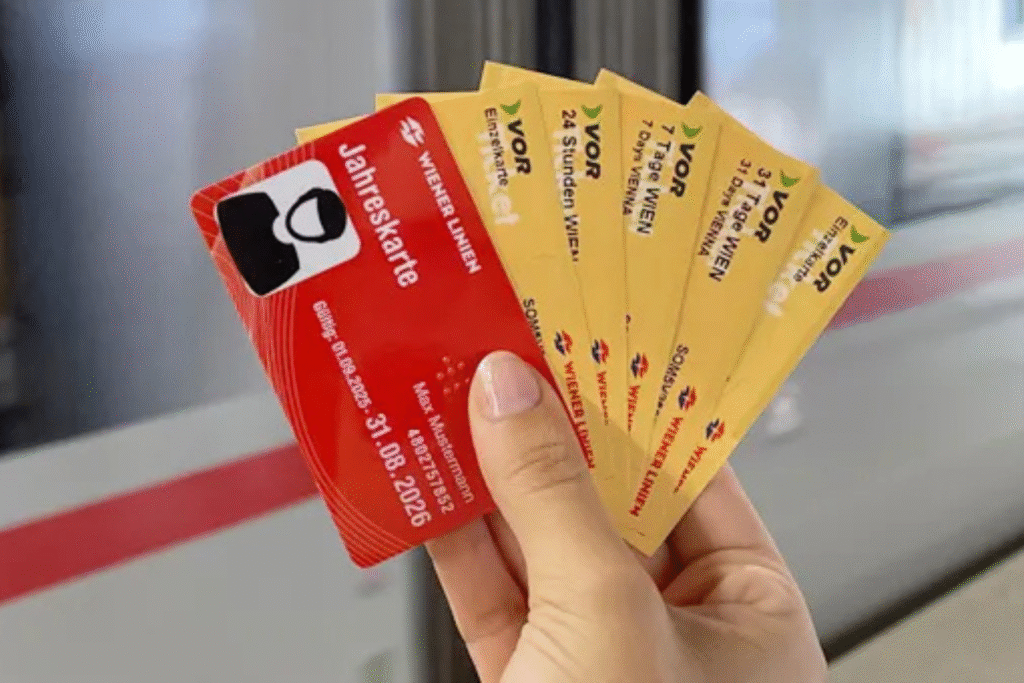
Vienna is increasing prices for public transport tickets and parking. Fares will rise by up to 30 percent. The annual pass for Wiener Linien will cost €467 instead of the previous €365—though there will be a discount for the digital version. Other tickets will also be adjusted accordingly. Parking will also become more expensive. Not only are the prices for parking tickets going up, but the residential parking permit (“Parkpickerl”) will also cost more. From now on, it will be €13 per month instead of €10.
Tourism will also be affected by a new measure. The city tax will be raised from 3.2 to 8.5 percent. The price hikes were presented on Monday by Finance City Councilor Barbara Novak and Transport and Planning City Councilor Ulli Sima (both SPÖ). They justified them with the budgetary situation and the increased need for consolidation.
New youth ticket
This is the first time in 13 years that the price of the annual pass has been raised. In 2012, the then red-green city government reduced it from €449 to €365. Starting January 1, 2026, the card will cost €467 if purchased in the classic plastic version. The digital version will cost €461. As Sima emphasized, there will also be a new youth ticket. People under 26 can buy it for €300 (€294 digital). Enrollment in a university is no longer required to qualify for the discounted ticket.
According to Sima, the increase was aligned with that of the nationwide Klimaticket. Although that ticket has existed for a shorter time, it has already become 27.85 percent more expensive. Other ticket types will also be affected, such as various single-ride categories. The offering will be streamlined: for a single ride, one can choose between a regular ticket or a discounted one for children and youth. The regular ticket will cost €3.20 (€3 digital), up from the current €2.40.
The senior single ticket will be eliminated, as will the 48-hour and 72-hour passes starting next year. On the other hand, the annual pass will now be indexed. Sima announced regular adjustments, arguing this was more sensible than leaving the price unchanged for years and then making a steep increase. Those caught riding without a ticket will also have to pay more: fare evasion fines will rise from €105 to €135.
Changes to the parking permit
Parking tickets will rise by 30 percent, also starting January 1. Specifically, the cost per half hour will increase by 40 cents, regardless of the ticket type. The Parkpickerl will switch from an annual fee to a monthly fee. Parking fines will also be raised.
The new city tax rate will apply starting December 1. Novak stressed that at 8.5 percent, Vienna will be in the international mid-range. The additional revenue is intended to finance projects aimed at reducing the ecological footprint of the city’s growing number of visitors.
The increases are essential to reach budget targets and cover the costs of city infrastructure, Novak insisted. The announced measures will contribute differently to consolidation: parking is expected to generate €81 million in additional revenue, the city tax another €81 million, and public transport up to €150 million annually.
Unified opposition
Vienna’s opposition parties criticized the package: raising prices for public transport and parking would not close the budget gap but would heavily burden residents, argued FPÖ spokesperson Klemens Resch. He speculated that citizens are being charged because Wiener Linien miscalculated its construction projects. Motorists, he added, should be relieved, not burdened. Permit holders already struggle to find spaces, especially in inner-city districts.
The Greens were angered that the city government is dismantling the “internationally acclaimed flagship” of the €365 annual pass. A cornerstone of climate-friendly mobility in Vienna is being destroyed, party leaders Judith Pühringer and Peter Kraus said. A price increase of more than €100 would hit low-income families particularly hard and further fuel inflation.
The Vienna ÖVP also condemned the measures. Instead of cutting within its own system, the SPÖ–NEOS city government is once again charging citizens, criticized deputy party chairman Markus Figl. Raising the public transport annual pass by over €100 hurts everyone who relies on it daily. Rather than improving efficiency or reforming Wiener Linien’s internal structures, the costs are being passed on to the public.
VCÖ: Counterproductive measure
The Austrian Transport Club (VCÖ) expressed general understanding for the fare hike but pointed out that in absolute numbers it is nearly three times higher than the increase in parking permits. The steep rise in the price of the annual pass compared to parking costs runs counter to the goal of shifting more traffic from cars to public transport, it warned.
The Austrian Hotel Association (ÖHV) criticized the city tax hike. Because Vienna calculates the tax as a percentage of the accommodation fee, the city profits from every new hotel opening, every industry investment, and every inflation-driven price increase, argued ÖHV president Walter Veit. Raising the percentage rate is therefore unnecessary, he insisted. He added that guests and families with smaller budgets are being overlooked.

